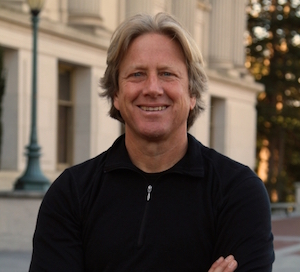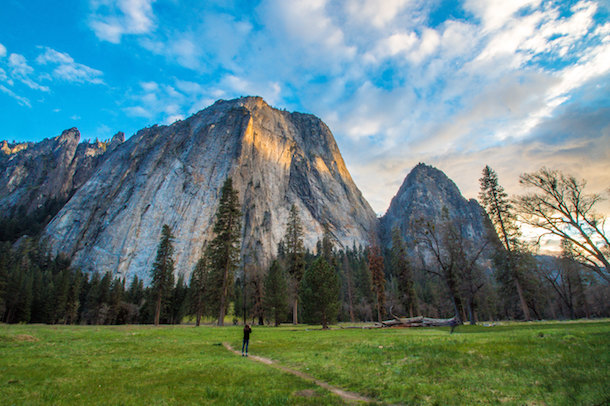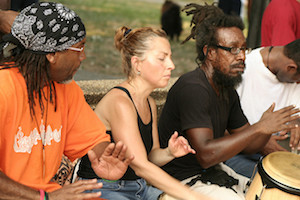Debunking Myths about Awe
By Maria Polonchek
What inspires awe? Who experiences it the most? Dacher Keltner discusses common misconceptions about an elusive emotion.
 Dacher Keltner
Dacher Keltner
What inspires awe? Who experiences it the most? Dacher Keltner discusses common misconceptions about an elusive emotion.
According to researchers across the country, experiencing awe can lower stress levels, expand our perception of time, and improve social well-being. As a parent, I’m especially intrigued by findings that awe encourages altruism and empathy, discourages entitlement and narcissism, and boosts creativity and academic performance.
Dacher Keltner, a psychology professor at UC Berkeley and a founding director of the GGSC, is the guy to talk to about awe. He co-authored a paper on awe in 2003 considered to be foundational, and has been involved in countless other studies since.
A self-described “transcendence junkie,” I know what awe has meant for me, but I was curious about other people. Who experiences awe? What triggers awe? What does it mean for our children? When I met with Dacher to ask him a few questions, I realized I had a lot of mistaken assumptions about awe—assumptions that many people share, and our culture seems to encourage. In the interview below, he debunks many of those assumptions and presents a view of awe as accessible, plannable, and absolutely essential.
Maria Polonchek: How did you get interested in studying awe?
 Dacher Keltner
Dacher Keltner
Dacher Keltner: I was a tense, anxious kid. I have a genetic predisposition towards anxiety that is the antithesis to awe: closed, obsessive, focused on narrow things. My parents had this disastrous divorce and I was on the road to unhappiness. But my parents also created a family context that encouraged me to push the boundaries and expand my mind. My mom is one of the more open people in the world. So I kept having these awe experiences that changed who I was. Going to Europe as a college student and backpacking and certain kinds of psychedelic drugs and rock-and-roll concerts and political experiences—each one moved my needle towards “This is what I should do in life. It’s right here, it has all this power, and I’ve got to study it.”
MP: When we talk about awe, we often refer to being outside, in nature. If you were ranking ways to experience awe, is nature the most common?
DK: We’ve studied that question in cities and cultures around the world and the number-one way people experience awe isn’t nature; it’s other people.
When humans were evolving, what was awe about? Mainly, it was other people’s magnanimity, their generosity: “That guy over there gave me some food.” And they get this rush of awe. When I think back to our hunter-gatherer conditions—unstable food sources, kids dying—the ability to share food is fundamental. If you gave me food when my kid was sick, that would be a sacred moment.
In a worldwide survey of awe experiences, people talk about seeing someone die, seeing a child being born, somebody saving their life or helping them out. And the second most common way is through nature.
It’s so interesting to me because I began this work thinking awe was about religious concepts, or scientific ideas, or poetry or art. Actually, awe’s foundations are in people and nature. It’s secular. Before religion was that stuff.
MP: That’s a completely different way to think about awe.
DK: Developmental psychologists are starting to look at awe, too. Kids are awestruck, they’re constantly amazed by stuff, their minds are blown—why? Essentially, their knowledge system is indicating that the dog or the leaves falling from a tree or this person’s generosity is really important. Their mind attaches a value to that: It’s precious and to be honored. It’s basically saying, “This matters. Wow.” So awe is fundamental to what we learn about the world.
In addition to learning, awe also helps with getting you into social collectives. If our ancestors didn’t get into a social collective, they were done; that’s how we survived. So awe is this all-purpose mechanism that says, “Wow, these are the values that matter to this group. This is how we all move together, through dance and rituals that attach me to this group. I’m awestruck by these things.”
MP: You’re saying that awe is fundamental, but what about people living under financial pressure or other difficult conditions? I think there’s a perception that awe is a luxury that’s not accessible to people without money.
DK: Empirically, from unpublished research coming out of my lab, we know that the less money you make, the more awe you feel. There’s a lot of awe in poor neighborhoods. It’s probably coming from different things, like a Gospel Church, a drumming circle in Oakland, or hip-hop and rap music (the best of it is the best art in the United States).
Awe ultimately is about the sacred and it has no monetary value. You can’t place a dollar amount on Yosemite or a bike ride or singing in a choir or looking at a painting. Money introduces a bunch of calculations and utilities, a mindset that almost counters the experience of awe. Consumerism, spending your day going to Pottery Barn instead of going outdoors, talking to your loved ones about what you can buy together—it’s a waste of time, and that’s what money encourages.
I used to believe that compassion, gratitude, awe—the three big moral sentiments—were for when life’s worked out and you have enough to meet your basic needs. But all of the data suggest that those are fundamental to human society. Thus far, we have data showing the poor are more compassionate, some data showing the poor are more grateful, and now some unpublished data showing the poor are more struck with reverence.
Taking into account the health and social benefits associated with those emotions and with awe, they’re essential to our survival. If kids aren’t feeling awe, their lives will be compromised. If we have a right to happiness, then we should have rights to these emotions. They’re not privileges or luxuries; they’re foundational.
MP: My kids talk to me about the awe they feel, but it’s through these collaborative online games, like building a world together in Minecraft. Is that really legitimate—or are they just trying to get more screen time?
DK: A lot of people feel we’re a little awe-deprived, that new technologies are taking awe out of our lives. I don’t necessarily agree with that.
It’s the “my kid’s rock-and-roll seems dangerous” phenomenon. Everybody knows and kids know that there’s no substitute for the woods and being around great people and having a tactile, palpable personal life.
But most people use technology for a lot of good. My daughters knew about Eric Garner before I did, because their friends said, “Did you see what happened to Eric Garner? Let’s go protest.” That’s awesome. They will know, collectively, about world events faster than I will.
When parents ask me about this, I tell them a few things. First of all, when I was your kid’s age, I spent four hours a day in front of a TV by myself, watching Gilligan’s Island. I didn’t learn anything, but it didn’t damage my brain; I’m going to be an okay human being.
Second of all, kids a generation ago watched TV four or five hours a day. Now they do two hours of gaming and apps. What they’re doing is more participatory. They’re filming and creating stuff. As humans, we like sharing knowledge.
MP: If my kids are experiencing awe in a way that’s so different from me, what can I do to understand their experience and connect with them?
MP: If my kids are experiencing awe in a way that’s so different from me, what can I do to understand their experience and connect with them?
DK: I used to struggle with something similar: How do I get my kids to be compassionate? I love compassion. I think it’s as important as awe.
Kids will have their own specific version of awe, but what you can do is plant the seed. Bring up the idea by talking about awe or pointing out the times you feel awe. Then they’ll know that mom values awe. And that idea will become a frame or organizing node in their minds; when they feel awe, they’ll realize it’s the same feeling you talked about.
Cultures evolve through innovation. It’s their job to be different, to find awe in new ways. We want our kids to value nature and generosity, but they’re going to do different things by design. Parents should honor what their kids find to be awe-inspiring.
MP: Many people these days think of awe as something unexpected, out of the blue. But what I’m hearing you say is that you can actively pursue awe.
MP: Many people these days think of awe as something unexpected, out of the blue. But what I’m hearing you say is that you can actively pursue awe.
DK: There’s an old idea about human passion, that it’s all a mystery; it washes over you like an ocean breeze, it’s unpredictable. But when people start hearing and reading about awe, my hunch is that they’re figuring out slots in their schedule to go get some.
I think it’s provocative and true to challenge people to schedule awe. Hey, you want this? Go schedule it. Most of the time, if I go volunteer at a prison, I feel awe. If I go hiking with my daughter, I’ll have a little piece of it.
Chade-Meng Tan, who cofounded Search Inside Yourself, advocates one minute of mindfulness a day to start. For awe, that means I should take the time to go outside my office and look at a tree and feel a little burst of awe. I didn’t believe in that approach at first, but seeing people respond to Meng convinced me. With one minute a day, you’ll build something. I think that’s true of awe as well.

